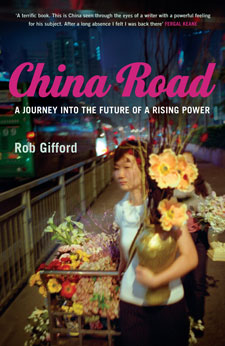Route 66, running from Chicago to Los Angeles, once represented the road to the future: a way into the heartland of the most dynamic nation on earth.
If you seek the same experience today, you should join Rob Gifford as he drives across the breadth of China on Route 312, from Shanghai over 5000 kilometres to the borders of Kazakhstan.
 The culture and society of one quarter (or is it one fifth?) of the world's population is all too easily squeezed into uniform Western generalisations. But as Rob Gifford, the English-born Beijing correspondent for National Public Radio (America's version of the ABC) explains, China is so vast and diverse that it is better understood as a continent or even an empire.
The culture and society of one quarter (or is it one fifth?) of the world's population is all too easily squeezed into uniform Western generalisations. But as Rob Gifford, the English-born Beijing correspondent for National Public Radio (America's version of the ABC) explains, China is so vast and diverse that it is better understood as a continent or even an empire.
The natural warmth of Gifford's Christian faith animates this book. "What must she have seen?" Gifford ponders as an elderly lady greets him at the door of a colonial-era church in Shanghai. He takes us to the grave of the pioneer missionary Hudson Taylor. One Sunday morning he is even pressed into the pulpit of a remote rural church, when its itinerant preacher doesn't turn up.
"There is a purity and intensity to Christian believers in China", Gifford writes. "Mention Christianity to ordinary Chinese people and they are not burdened by visions of crusading soldiers, fornicating popes or right-wing politicians." Arriving at this faith late in its history, it is for them "a matter of the heart".
Gifford meets plenty of the newly rich, but also searches out those whom China's prosperity has left behind " a whole village of people so poor they sold their own blood and were infected with AIDS. He is shocked to consider what kind of reputation Westerners must have, when a prostitute solicits him.
This book isn't about Christianity though: it's about China; and in particular "Old Hundred Names" " the Chinese term for ordinary folk: men and women, truck drivers, businessmen, and especially peasants who, even though almost everything now seems to be manufactured in China, are still the majority of its population.
Gifford writes to give his fellow "Ocean People" " that's us " a taste of the country he loves. Do you know Mandarin? Not to worry: Gifford gives a phonetic pronunciation of the name of everyone he meets and every town he visits. Along the way he recalls Europeans who came before him " grave-robbers and drug-dealers many of them; but also remarkable missionaries, like Mildred Cable and Francesca French, sent out by the China Inland Mission on the Silk Road in the 1920s, to preach the gospel and render basic medical care.
Not overlooking politics or human rights, he meets members of China's Muslim and Tibetan minorities. Officially, Beijing promotes their cultures, but internal migration and economic growth are gradually overwhelming them.
On a bus out of Minqin (pronounced min"chin) Gifford meets a "family planning team", whose job is to enforce the one-child policy, by forcing women to abort unborn children up to eight months in the womb. Where else in the world could this enormity co-exist with the delegates of An Li (Amway) he encounters in the next town: instantly recognisable by the revivalist style of their meetings " even on the edge of the Gobi Desert.
Only occasionally does Gifford encounter other Westerners: some of the international tourists who have begun to trickle even into China's remoter parts to see its natural and cultural wonders. But long before I finished this book, I longed to join them.





















